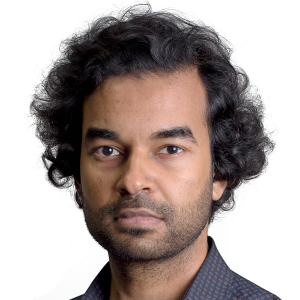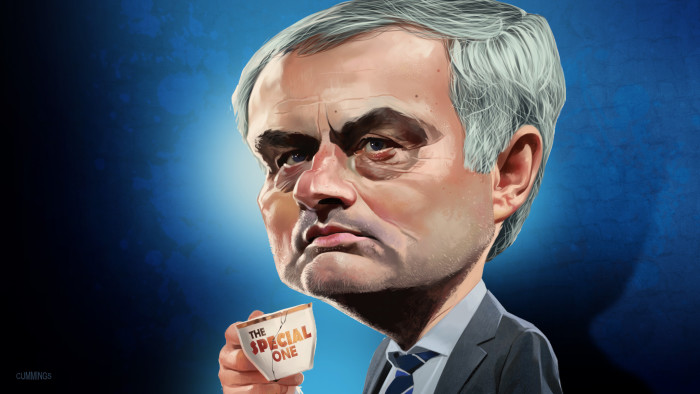José Mourinho, football’s Lord of Chaos


Roula Khalaf, Editor of the FT, selects her favourite stories in this weekly newsletter.
Imagine that José Mário dos Santos Mourinho Félix stuck with the business course his mother enrolled him on in his early twenties, when his football career fizzled out. He is now a private equity boss. He barges into a company and raises its performance, discarding orthodoxies and politesse before leaving to repeat the trick elsewhere. Stints in London, a spell in Milan, some tricky years with a famous brand in Madrid: the itinerant career of Davos Man.
Harvard MBA students take lectures from Sir Alex Ferguson but the former Manchester United manager is a bad case study. Most executives cannot spend 27 years atop one organisation, eclipsing its board and amassing the power of a god. Chelsea’s Portuguese coach, with his three-year terms and contingent relationships, is more like it.
All Mourinho’s story lacked was a crisis — until now. Having won the English Premier League last season, Chelsea is currently ranked 15th out of 20 teams, losing half its 10 games so far. It is also aflame with controversy. Mourinho has quarrelled with referees, journalists, his employers and, in the tawdriest episode of a career that has included poking a rival coach in the eye, a member of his own medical staff.
If Roman Abramovich, Chelsea’s Russian owner, decides his manager’s severance package is worth paying to quell the commotion, we will have lived through another turn of the Mourinho cycle. He takes over a club, briskly populates the trophy cabinet, captivates neutrals with his seething intelligence, then departs amid faltering performances and a foul atmosphere of his own creation. Chelsea from 2004 to 2007, then Inter Milan until 2010, then Real Madrid until 2013, now Chelsea again: a life of glory and transience.
Football’s Lord of Chaos was born to a comfortable home in Setúbal, near Lisbon, in 1963. His father was a professional goalkeeper and his mother a teacher.
“More time to study”, Mourinho theorises, is what makes undistinguished footballers great managers. He tried his hand as a defender for small Portuguese clubs but knew early on that management was his calling. Already multilingual and obsessed by the fine margins that decide matches, he left business school after a day to study sports science at the Technical University of Lisbon. From there he chased coaching qualifications and passed through several clubs until a beguiling offer came in 1992.
Bobby Robson, Sporting Lisbon’s new English manager, needed an interpreter. The job would divert Mourinho from coaching but acquaint him with a wise elder of the game. He stunned Robson with his knowledge of football and followed him to mighty Barcelona in 1996, expanding his role to scout on the way.
Mourinho and the Catalan club, the game’s great stylists, would later cultivate a poisonous enmity. But Barcelona was a lesson in elitism. Proximity to megastars taught him his tactical mastery would amount to nothing without the charisma to bend millionaires to his will. He took the education home, where he worked his way to Porto as head coach.
His smart, spiky team won the league, the Uefa cup and then — still the unanswerable achievement of his career — the Champions League, Europe’s highest prize. This feat, decorated by his raffish looks and quotable bombast, made him a star in England even before he arrived in 2004 with his wife, Matilde, and their two young children. So began a decade of serial success in Europe’s elite leagues.
The Mourinho method blends logic with emotion. The coach wins by devising sophisticated game plans, but also by creating an intense working atmosphere that eventually burns itself out. He sets his players against the outside world, confecting grievances and stoking aggression even as he compiles bespoke tactical dossiers with a cool head. He preaches discipline and nihilism. He works with science and fire.
His worldview comes out in his divergent relations with players. He likes Branislav Ivanovic, an unglamorous follower of instructions. With Eden Hazard, gifted princeling of Europe’s space-age football academies, the rapport is businesslike at best. He favours self-made players who smoulder with what you might call “competitive spirit” and what Londoners call “aggro”.
Mourinho’s zenith came five years ago when his Inter Milan held Barcelona, then possibly the best team in the history of the game, to a 1-0 defeat away from home — after winning the home leg — for a 3-2 aggregate win. Catalans jeered him as El Traductor (The Translator) but he was through to another Champions League final he would win.
And now Chelsea’s meltdown. It has no recent precedent in a major league and Mourinho’s reputation might fray with it. His wars with the world are increasingly hard to pass off as clever diversionary gambits. His impatience with flair players looks, for the first time, self-defeating: Kevin de Bruyne, whom he released in 2014, now lights up Manchester City as a £55m maestro.
If Chelsea recover, Mourinho remains on a trajectory to all-time greatness, along with perhaps only Italy’s Carlo Ancelotti and the Spaniard Pep Guardiola of his generation. But if his tenure ends in another stink, his CV may take on a less flattering cast.
Is he a serial winner or a short-termist incapable of building things to last? Does he prize a team ethic or is he plain stumped by lone visionaries such as Hazard and de Bruyne? And these trophies — does he not win them with clubs that would be winning them anyway? These questions would have been impudent six months ago. Managers are always fighting for their jobs. Mourinho is fighting for his place in history.
The writer is the FT’s political columnist
THIS COLUMN HAS BEEN AMENDED TO REMOVE REFERENCES TO A SPECIFIC MATCH AT THE TIME OF ITS ORIGINAL PUBLICATION
Comments